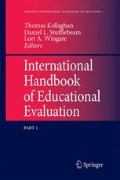Abstract
Responsive evaluation is an approach, a predisposition, to the evaluation of educational and other programs. Compared to most other approaches it draws attention to program activity, to program uniqueness, and to the social plurality of its people. This same predisposition toward merit and shortcoming can be built into or can be recognized in other approaches, such as a stakeholder evaluation or connoisseurship evaluation.
Access this chapter
Tax calculation will be finalised at checkout
Purchases are for personal use only
Preview
Unable to display preview. Download preview PDF.
References
Atkin, J.M. (1963). Some evaluation problems in a course content improvement project. Journal of Research in Science Teaching, 1, 129–132.
Cronbach, L.J. (1963). Course improvement through evaluation. Teachers College Record, 64, 672–683.
Easley, J.A., Jr. (1966). Evaluation problems of the UICSM curriculum project. Paper presented at the National Seminar for Research in Vocational Education}. Champaign, IL: University of Illinois.
Greene, J.C. (1997). Evaluation as advocacy. Evaluation Practice, 18, 25–35.
Guba, E., & Lincoln, Y. (1981). Effective evaluation. San Francisco: Jossey-Bass.
Hamilton, D., Jenkins, D., King, C., MacDonald, B., & Parlett, M. (Eds.). (1977). Beyond the numbers game. London: Macmillan.
House, E.R. (1980). Evaluating with validity. Beverly Hills, CA: Sage.
Kushner, S. (1992). A musical education: Innovation in the Conservatoire. Victoria, Australia: Deakin University Press.
Mabry, L. (1998). Portofios plus: A critical guide to alternative assessment. Newbury Park, CA: Corwin Press.
MacDonald, B. (1976). Evaluation and the control of education. In D.A. Tawney (Ed.) Curriculum evaluation today: Trends and implications. London: Falmer.
MacDonald, B., & Kushner, S. (Eds.). (1982). Bread and dreams, CARE. Norwich, England: University of East Anglia.
McKee, A., & Watts, M. (2000). Protecting Space? The Case of Practice and Professional Development Plans. Norwich, England: Centre of Applied Research in Education, University of East Anglia.
Parlett, M., & Hamilton, D. (1977). Evaluation as illumination: A new approach to the study of innovatory programmes. In D. Hamilton, D. Jenkins, C. King, B. MacDonald, & M. Parlett (Eds.), Beyond the numbers game. London: Macmillan.
Schwandt, T.A. (1989). Recapturing moral discourse in evaluation. Educational Researcher, 18(8), 11–16.
Shadish, W.R., Cook, T.D., & Leviton, L.C. (1991). Foundations of program evaluation. Newbury Park, CA: Sage.
Stake, R.E. (1974). Program evaluation, particularly responsive evaluation. Reprinted in W.B. Dockrell & D. Hamilton (Eds), (1980). Rethinking educational research. London: Hodder and Stoughton.
Stake, R.E. (1986). Quieting Reform: Social science and social action in an urban youth program. Champaign, IL: University of Illinois Press.
Stake, R.E. (1998). Hoax? Paper at the Stake Symposium on Educational Evaluation, May 9, 1998. Proceedings edited by Rita Davis, 363–374.
Stake, R.E., & Easley, J. (Eds.). (1978). Case studies in science education (Vols. 1-16). Urbana IL: University of Illinois.
Stake, R.E., Migotsky, C., Davis, R., Cisneros, E.J., Depaul. G., Dunbar, C., et al. (1997). The evolving synthesis of program value. Evaluation Practice, 18(2), 89–103.
Stufflebeam, D.L., & Shinkfield, A.J. (1985). Systematic evaluation: A self-instructional guide to theory and practice. Boston: Kluwer-Nijhoff Publishing.
Author information
Authors and Affiliations
Editor information
Editors and Affiliations
Rights and permissions
Copyright information
© 2003 Kluwer Academic Publishers
About this chapter
Cite this chapter
Stake, R. (2003). Responsive Evaluation. In: Kellaghan, T., Stufflebeam, D.L. (eds) International Handbook of Educational Evaluation. Kluwer International Handbooks of Education, vol 9. Springer, Dordrecht. https://doi.org/10.1007/978-94-010-0309-4_5
Download citation
DOI: https://doi.org/10.1007/978-94-010-0309-4_5
Publisher Name: Springer, Dordrecht
Print ISBN: 978-1-4020-0849-8
Online ISBN: 978-94-010-0309-4
eBook Packages: Springer Book Archive

